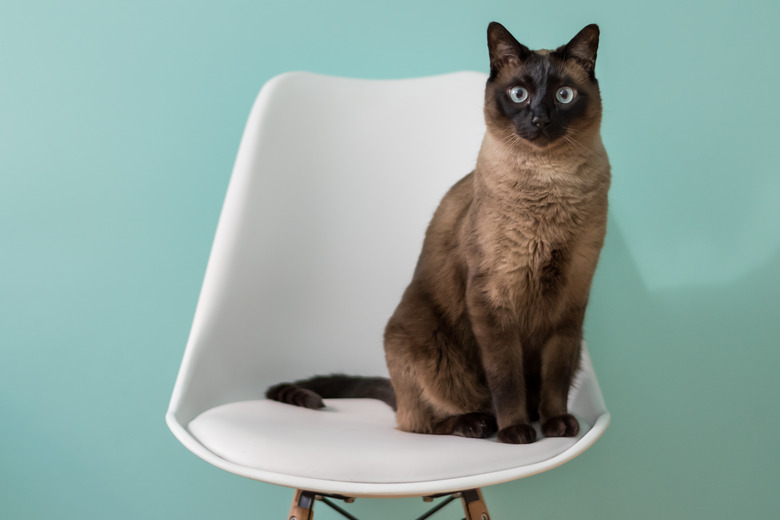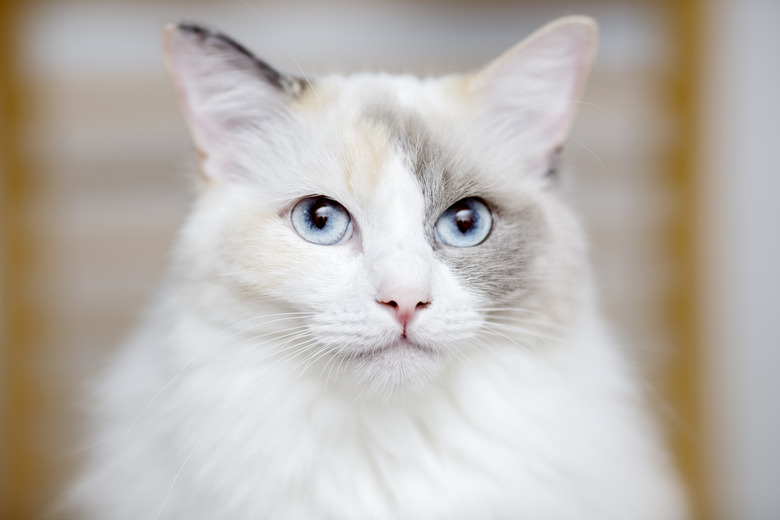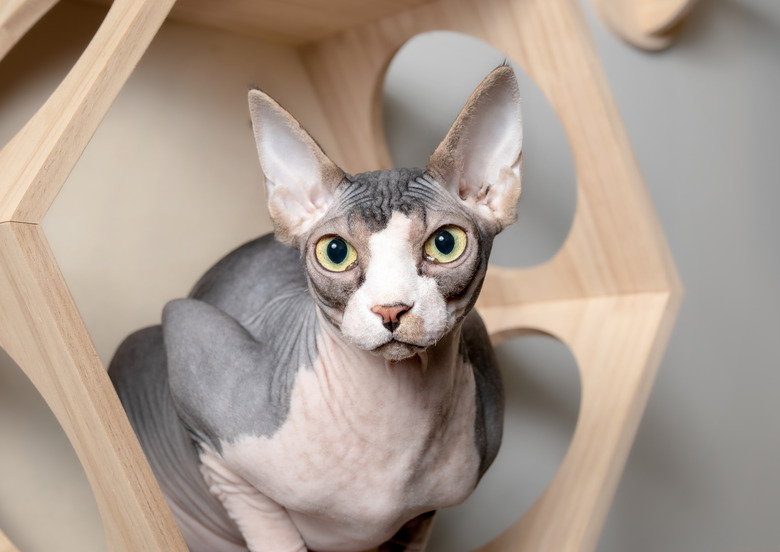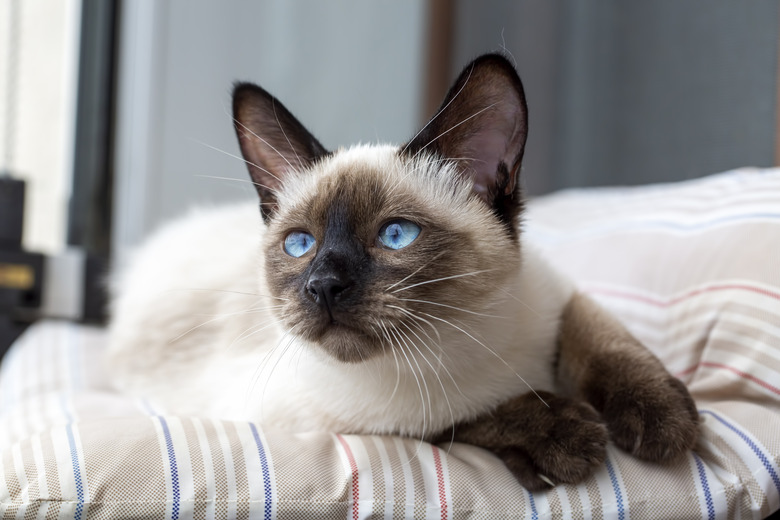The Cat Breeds That Shed The Most (And Least)
We cat lovers have a deep affection for our furry pets. Though shedding often accompanies the joys of cat stewardship, it can be tedious cleaning up hair from our laps, couches, and just about every surface in the household. Even with regular grooming, some cats will still fill your life with fur (and love). For humans with allergies, managing cat hair is a daily activity. If you're ready to become a cat parent, but not necessarily a cat groomer — then knowing which breeds shed the most and the least will help you to adopt a new cat who will hopefully fit into your lifestyle.
Cat breeds that shed the most
Cat breeds that shed the most
Adoption data compiled by the Humane Society shows that most cats in the U.S. are mixes (pure breeds are rare). So determining a cat's breed is often more about figuring out which breeds your cat most resembles. The most distinctive trait about a cat is how much they shed, according to "The Complete Cat Breed Book" (DK Publishing, 2013). So, without further fuss and fur, let's shed some light on the cat breeds that molt the most!
- Ragdoll
- Ragamuffin
- Siberian
- American bobtail
Ragdoll
The ragdoll is an American classic. This long-haired cat is known for their agreeable nature, blue eyes, and characteristically shedding their beautiful, long coat — everywhere. While the ragdoll will meticulously groom themselves, you will also need to set a daily reminder to give yours a thorough brushing. Cuteness cat expert and noted rescuer, Susan Dorling, recommends brushing longhairs from head to tail before grooming their undercoats. This prevents painful matting that usually requires a shearing at the groomers to remove.
Ragamuffins
A close cousin to the ragdoll, the ragamuffin is also known for their long, luxurious coats. In fact, their coats are so soft that many ragamuffins do not suffer tangles and mats. At least, not to the same degree that other longhairs do. Still, Dorling recommends that you brush yours a couple of times a week with a stainless steel comb to remove dead fur and debris.
Siberian
Regarded as one of the fluffiest cat breeds around, the Siberian is also a known shedder because of their distinctive triple coat. While you can plan on spending weekends vacuuming up pet hair, at least it will be allergen-free pet hair. Yes, the Siberian is often a hypoallergenic cat. This is good news for households that may suffer allergic reactions to dander or the proteins found in sloughed feline skin cells.
American Bobtails
What sets the American bobtail apart from its cousins — the Minx and the Japanese bobtail — is the amount of shedding. Most longhaired bobtails will shed, but Americans bobtails shed more. The American bobtail is a hearty breed with shaggy, dense fur that is reported to clog normal vacuums. So if you're thinking of adopting an American bobtail mix, invest in a good pet-hair vacuum!
Cat breeds that shed the least
Cat breeds that shed the least
Even though there is a lineup of hairless and shorthair breeds, not all grow low or no-shed coats (well, except for pure bred hairless — they don't grow coats). Yet, mixes with these breed traits are popular for households who want to keep the cleaning to a minimum.
- Sphynx
- Burmese
- Cornish Rex
- Devon Rex
- Siamese
- Russian blue
Sphynx
Just remember that bald is beautiful, and the sphynx is one of the most beautiful "balds" ever. With pointed, prominent ears, piercing eyes, and a loveable personality — sphynx cats will not shed because they have no fur! However, the sphynx is not a hypoallergenic cat breed. Their skin and saliva still produce allergens. So friends and family may still itch and sneeze when they visit. But, hey — at least you won't have to vacuum so much!
Burmese
Being one of the cat breeds that live the longest, not only will your Burmese snuggle on your couch for years — they will do so without leaving hair all over it. The Burmese is a shorthair whose coat generally boasts chocolate to mocha shades with a fine, satin-like sheen. However, your Burmese mix may come in a variety of colors and patterns, including tortoiseshell. Although, being a shorthair, Burmese will still require some brushing to keep their coat clean and in good condition. Expect to groom yours at least once per week.
Cornish Rex
While many cats have double coats, the Cornish Rex typically only has a single undercoat that is soft, curly, and less prone to shedding than other breeds. Here's a fact for your cat-hair trivia night: The term "rex "or "rexxed" is a word used for curled. So the Cornish Rex, German Rex, Selkirk Rex, and Devon Rex all boast genetic mutations that give their short hair a curly attribute. Plus, the "Rexes" often have hypoallergenic fur, too. Still, like its shorthaired cousins, the Cornish Rex will need basic weekly grooming. Dorling recommends brushing yours with a fine-toothed comb to keep their coat healthy.
Devon Rex
Cats generally have three types of fur: guard hair, awn hair, and down hair. The Devon Rex is unique because it has little to no guard hair, which is why this beautiful breed sheds much less than others. Widely renowned for their hypoallergenic coats, the Devon Rex is a cat breed that stays small. So even when they do shed, it will only be in little amounts.
Siamese
Affectionate and playful, the Siamese is a shorthair with an elongated body, thin tail, and a fine, glossy coat that rarely sheds (outside of molting season). The Siamese is one of the oldest cat breeds and many of today's contemporary breeds are derived from this historical original, including the Balinese, Birman, Burmese, and Himalayan.
Russian blue
While the Russian blue has a thick coat, pure breeds typically shed very little. Yet, if your mix boasts Russian blue as one of several breeds in their lineage — you'll most likely notice lots of shedding because of the blue's characteristic double coat. Still, at least the shed hair will be largely allergen-free, as this gorgeous cat is known to be hypoallergenic.
In Summary
In Summary
If you regard cats as the perfect life companions, but avoid cleaning up cat hair like it's the plague, then understanding which cat breeds shed the most and least will help you adopt the perfect friend. However, just because a cat may shed more than others, doesn't make them any less desirable. All kitties deserve a forever home, and it's our job to provide them with that. But if you have a severe allergy or even a medical condition that makes shedding a problem in your life, consider adopting a hairless or short-haired cat that doesn't shed so much!



